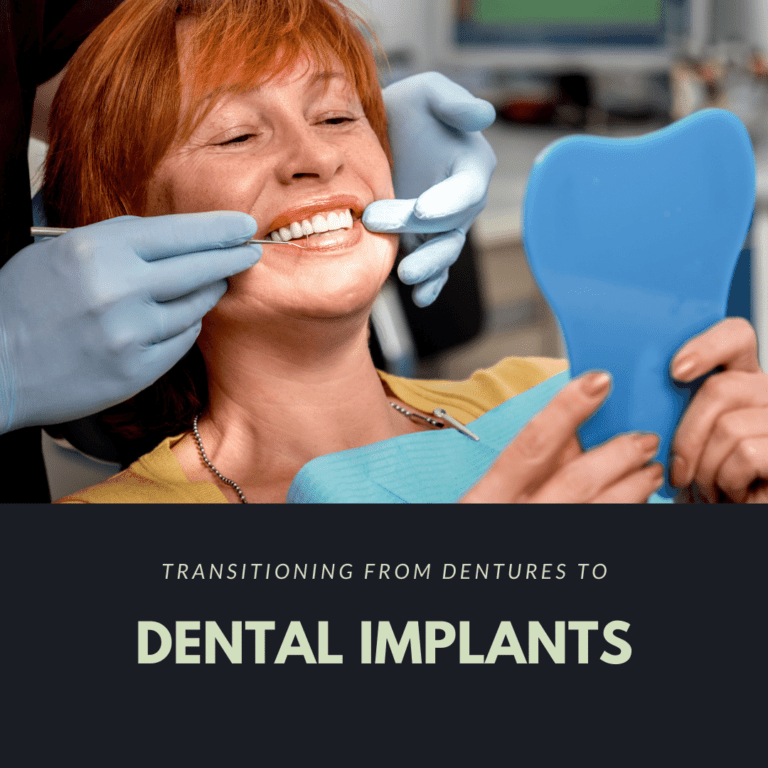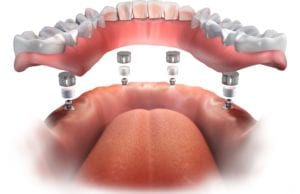Transitioning from Dentures to Dental Implants

Dentures and dental implants are two types of dental prosthetics your dentist uses to replace multiple missing teeth. In fact, both can be used to replace an entire arch of teeth, as well as an entire mouth of missing teeth. However, dentures tend to have a shorter lifespan than dental implants, which means you may find yourself wanting to have dental implants placed instead of having another denture fabricated. If this sounds familiar, there are some things you should know about how to transition from dentures to dental implants.
Why make the switch?
The first thing you should consider is why you want to switch from dentures to dental implants. At a glance, there are several benefits to switching from dentures to dental implants, including:
- Dental implants can preserve bone mass, maintain the natural shape of the jaw, and do not require replacement. Dentures, on the other hand, cannot preserve bone mass which causes the shape of the jaw to change over time. As this happens, dentures will no longer fit properly or comfortably and will need to be replaced.
- Dental implants are placed into the jawbone, while dentures are placed on top of the gums. This means that dental implants are stronger and stationary since they are fused with the bone, while dentures tend to slide and shift since they are only attached by suction.
- Dental implants function like natural teeth, which means they can be used to chew tough foods that dentures cannot. Additionally, dental implants also have a more natural appearance than dentures.
- Although dental implants have a higher upfront cost, they will save you money over time since they do not need to be replaced. On average, you can expect to have your dentures relined about every 2 years.
Can I switch from dentures to dental implants?
Before making the switch from dentures to dental implants, you will need to schedule an appointment with your dentist to determine if dental implants are the right fit for you. During this appointment, your dentist will perform dental x-rays in order to evaluate the health of your jawbone. If you have had missing teeth and dentures for a while, then you will likely need to have a bone graft before having dental implants placed.
What is the transition like?
Bone grafts are performed about 4-6 months before dental implants can be placed. During a bone graft, bone material is placed at certain locations in the jawbone. Over the next few months, the bone material will harden into new bone growth that can support dental implants. After your bone graft has healed, then you will get your dental implants.
To place dental implants, a minor oral surgery is needed. During this surgery, your dentist will first make an incision in your gums to access your jawbone. Then they will shape the empty tooth socket so that it can accommodate an implant screw. Finally, they will place the implant screw. In most cases, you can expect this procedure to be repeated about 4-6 times so that 4-6 implants are placed in each arch. This is because multiple implants are required for an implant-supported denture.
Once your implants have been placed, you will need to stay on a temporary soft foods diet in order to let them heal properly. This usually takes about 3-6 months, since new bone has to grow in order to fuse the implant screw to the jawbone. During this time, it is essential to avoid placing excess strain on the implants because it can cause them to shift or heal crooked. Once the implants have fused with the jawbone, then your dentist will let you know to return to your normal diet.
Caring for your implant-supported denture is also slightly different from caring for a traditional denture. This is because implant-supported dentures are not removable, thus you will care for them like you would your natural teeth. The main difference between dental implants and natural teeth is that you will need to floss around the junction between the dental crown and implant.







Recent Comments